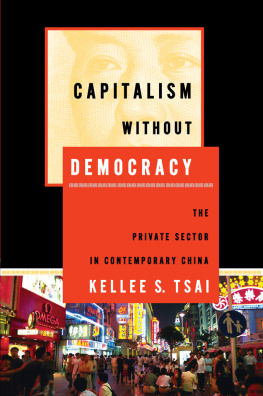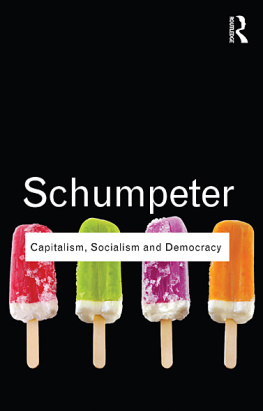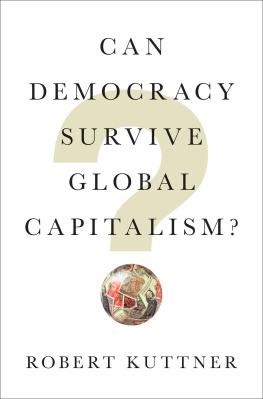Kellee S. Tsai - Capitalism without Democracy
Here you can read online Kellee S. Tsai - Capitalism without Democracy full text of the book (entire story) in english for free. Download pdf and epub, get meaning, cover and reviews about this ebook. publisher: Cornell University Press, genre: Politics. Description of the work, (preface) as well as reviews are available. Best literature library LitArk.com created for fans of good reading and offers a wide selection of genres:
Romance novel
Science fiction
Adventure
Detective
Science
History
Home and family
Prose
Art
Politics
Computer
Non-fiction
Religion
Business
Children
Humor
Choose a favorite category and find really read worthwhile books. Enjoy immersion in the world of imagination, feel the emotions of the characters or learn something new for yourself, make an fascinating discovery.
- Book:Capitalism without Democracy
- Author:
- Publisher:Cornell University Press
- Genre:
- Rating:5 / 5
- Favourites:Add to favourites
- Your mark:
- 100
- 1
- 2
- 3
- 4
- 5
Capitalism without Democracy: summary, description and annotation
We offer to read an annotation, description, summary or preface (depends on what the author of the book "Capitalism without Democracy" wrote himself). If you haven't found the necessary information about the book — write in the comments, we will try to find it.
Capitalism without Democracy — read online for free the complete book (whole text) full work
Below is the text of the book, divided by pages. System saving the place of the last page read, allows you to conveniently read the book "Capitalism without Democracy" online for free, without having to search again every time where you left off. Put a bookmark, and you can go to the page where you finished reading at any time.
Font size:
Interval:
Bookmark:
The biggest problems in China are corruption and absence of the rule of law. But democracy wouldnt solve these problems because the Chinese masses are too ignorant to participate in politics.
Private entrepreneur in Shanghai, 2005
In the summer of 1989, when college students were squatting in Tiananmen Square, demanding democracy, Beijings street vendors donated food and water to the students. Private copy shops operated their fax machines around the clock to spread the word. A brigade of private entrepreneurs on motorcycles dubbed the Flying Tigers spontaneously formed to deliver messages and patrol the perimeters of Beijing for signs of troop movement toward the square (Li et al. 1989, 189193).
Even a decade after the Tiananmen crisis, Jonathan Adelman boldly asserted, It is hard for the great majority of Americans who have not visited China or followed it closely to realize that China is in the middle of a historic transition to capitalism and ultimately democracy (Adelman 2001, 41A). Hu Shaohua elaborates on this general logic in Explaining Chinese Democratization (2000):
China is one of the fastest-growing economies in the world, and its economy probably will continue to expand in the foreseeable future. The growing economy will bring higher living standards, a higher level of education, and a more complicated socioeconomic structure in its wake. Under these circumstances, more people will demand more freedom and democracy. (155)
Other scholars have devoted their energies to identifying the economic benchmarks for regime transition. Stanford economist Henry Rowen predicted that if China maintained a 5 percent per capita growth in gross domestic product, then by 2015 it will reach a critical threshold of $7,0008,000 per capita GDP and become democratic (Rowen 1996, 61, 6869). China has already commenced a dual-step transition to democracy such that China has gone through its first stage of transition from totalitarianism to authoritarianism and is on the verge of starting the longer-term, second transition toward democracy (8384). Using a resource distribution index, Tatu Vanhanen (2003) finds that China has already reached the transition level for democracy.
Such predictions are inspired in part by the stunning expansion of Chinas private sector since the late 1970s. In 1977, China did not even keep official statistics on private enterprises because they were illegal and negligible in number. By 2005, there were 29.3 million private businesses, employing over 200 million people and accounting for 49.7 percent of the GDP (China Daily, December 14, 2005). Yet private property rights are not protected consistently by rule of law, private entrepreneurs lack access to most conventional sources of credit, and business owners are denied the opportunity to vote for political leaders who will defend their material interests. Hence, based on the evolution of democracy in a handful of Western countries, many observers expect that Chinas growing population of capitalists will naturally agitate for democracy in the spirit of no taxation without representation. They will strategically leverage their economic resources to acquire political ones. As Zheng Yongnian puts it, Chinese business classes are likely to play a role that their European counterparts did in the past. Capitalism is generating a Chinese bourgeoisie. It is a class with teeth (Zheng 2004, 311).
The 1989 images of private business owners helping democracy activists are outdated and misleading. This entrepreneurs loyalty to the regime was especially apparent when he voluntarily expressed strong approval for the way that the central government dealt with student protestors in 1989. He believed that the crackdown maintained the social stability necessary for continued economic growth.
Rather than assuming that Chinese entrepreneurs are going to demand democratic reforms, I suggest that it is more instructive to assess whether members of the current generation of capitalists share a common identity and definition of interestswhich would be necessary for constituting a politically assertive class or even part of a class (Thompson 1966; cf. Katznelson 1986). Chinas business owners are diverse. Most do not fall into the income and lifestyle strata that we regard as constituting the middle class. This is not to say that private sector development is politically irrelevant or that China will never develop some form of democracy but, rather, that the sequence of events leading to capitalist demands for democracy in a handful of other countries is distinctive and unlikely to be replicated. Chinas private entrepreneurs should be analyzed on their own terms to understand how and to what extent they are politically consequential. Based on hundreds of in-depth interviews and an original national survey of business owners, in this book I demonstrate that Chinas capitalists are pragmatic and creative but they are not budding democrats.
The belief that capitalists must demand democracy is a myth, not a law of social science. Historically, the processes that lead to democratization are highly contingent and involve a multiplicity of actors and institutions. China is no different in this regard, so debunking this popular myth is not difficult. In this book I do not predict whether China will someday become a liberal democracy. I do, however, assert with a high level of certainty that should democratization occur in China, it will not be led by a disgruntled horde of private entrepreneurs.
Private entrepreneurs may not be clamoring for democracy, but they are influencing Chinese politics. In the course of their day-to-day interactionswith one another and with local officialsentrepreneurs are changing the countrys formal political institutions in ways that reflect their needs and interests. Although liberal democracies permit many direct forms of political expression, what Chinas entrepreneurs are doing is more subtle and possibly more effective in conveying their policy concerns than voting, lobbying, and protesting. In this book I thus engage the more complex issues of what it really means to be a private entrepreneur in China, how entrepreneurs actually perceive themselves, and, most fundamentally, how they get things done. We will see that business owners must navigate a myriad of political and regulatory restrictionsand in doing so, how they have fundamentally altered the formal political landscape. We will also see that the private sectors political influence has unfolded in an indirect and incremental manner. In examining these issues, I explain why Chinas private entrepreneurs are not out on the streets demanding democracy and why significant institutional transformations have occurred in Chinas political economy in the absence of regime change. The answers to these apparent paradoxes are grounded in the daily practices of business owners and their official regulators. Local economic and state actors have evaded, exploited, and appropriated formal institutions through a variety of informal adaptive strategies. Ultimately, the adaptive informal institutions of private entrepreneurs have had a structural impact on the formal institutions governing Chinas political economy.
These claims have broader implications for theoretical debates concerning political and institutional development as well as implications for the study of democracy. China does not fit preexisting models of political economy, and indeed it defies the expectations of many familiar explanations in the study of comparative politics. Analyzing the process of private sector development in reform-era China does, however, yield insights into the dynamics of endogenous institutional change. Despite ongoing regime durability, a number of the countrys political, economic, and even social institutions have undergone momentous transformations since the late 1970s. Rather than confirming prevailing theories of political development, the causal mechanism underlying many of these transformations lies in the informal interactions among local state and nonstate actors. Conventional explanations of democratic development and regime change generally overlook the causal potential of informal practices and institutions to change or sustain formal institutions. Meanwhile, studies of transitions from socialism have been more attentive to the relevance of informal institutions and socialist-era legacies, but they have focused more on how deep-rooted informal institutions undermine formal ones rather than how they may contribute to the resilience of formal institutions.
Font size:
Interval:
Bookmark:
Similar books «Capitalism without Democracy»
Look at similar books to Capitalism without Democracy. We have selected literature similar in name and meaning in the hope of providing readers with more options to find new, interesting, not yet read works.
Discussion, reviews of the book Capitalism without Democracy and just readers' own opinions. Leave your comments, write what you think about the work, its meaning or the main characters. Specify what exactly you liked and what you didn't like, and why you think so.













